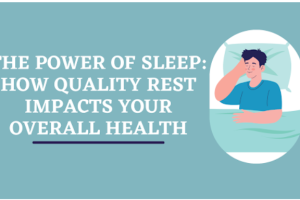The Power of Sleep: How Rest Impacts Your Health

Introduction to the Importance of Sleep
Understanding the Basics of Sleep
Sleep is often overlooked in today’s fast-paced society, yet it is one of the most crucial elements for overall well-being. Everyone can relate to those nights where sleep eludes them; you may find yourself tossing and turning, staring at the ceiling, or even scrolling through your phone, wishing for a few more hours of rest. Understanding the basics of sleep is vital, as it helps to appreciate its importance. Sleep can be broken down into two main types:
- The Power of Sleep: How Rest Impacts Your Health
- Introduction to the Importance of Sleep
- Understanding the Basics of Sleep
- The Science Behind Sleep Cycles
- The Physical Effects of Poor Sleep
- Impact on Immune System
- Link to Chronic Health Conditions
- The Mental Health Connection
- Effects on Cognitive Function
- Relationship to Mental Health Disorders
- Sleep and Weight Management
- Influence on Metabolism
- Connection to Appetite Regulation
- Strategies for Improving Sleep Quality
- Creating a Sleep-Friendly Environment
- Establishing a Bedtime Routine
- The Role of Technology in Sleep
- Impact of Screens on Sleep Patterns
- Using Technology to Enhance Sleep
- Sleep Disorders and Their Effects
- Common Sleep Disorders
- Consequences of Untreated Sleep Disorders
- Non-Rapid Eye Movement (NREM) Sleep: This stage consists of various phases, from light sleep to deep sleep, playing a key role in physical restoration.
- Rapid Eye Movement (REM) Sleep: Known for vivid dreaming, REM sleep is essential for cognitive functions and emotional regulation.
Each cycle of sleep lasts about 90 minutes and repeats several times throughout the night, showcasing the intricate nature of sleep.
The Science Behind Sleep Cycles
Diving into the science behind sleep cycles reveals how essential rest is for the mind and body. During a typical night, one experiences multiple cycles that alternate between NREM and REM sleep. Here’s a quick overview:
- Stage 1 (NREM): Transition into light sleep, lasting a few minutes.
- Stage 2 (NREM): A deeper sleep phase, where body temperature drops and heart rate slows.
- Stage 3 (NREM): Deep sleep, vital for physical recovery and growth.
- REM Sleep: Brain activity increases, dreaming occurs, and memory consolidation happens.
Understanding these cycles can motivate individuals to prioritize quality sleep, ultimately leading to improved health and well-being.
The Physical Effects of Poor Sleep
Impact on Immune System
Poor sleep can wreak havoc on the immune system, making individuals more susceptible to illness. Imagine trying to run a marathon without proper training—this is similar to how the immune system struggles when deprived of quality rest. Studies have shown that inadequate sleep impacts the body’s production of protective cytokines, which are essential for fighting off infections and inflammation. Consider the following points:
- Decreased Immune Response: Lack of sleep can lower the body’s ability to produce antibodies and infection-fighting cells.
- Increased Inflammation: Sleep deprivation leads to elevated levels of inflammatory markers, putting additional strain on the body.
This connection between sleep and immunity highlights the need for adequate rest, especially during cold and flu season!
Link to Chronic Health Conditions
Furthermore, poor sleep is linked to various chronic health conditions, creating a cycle that can be hard to break. For instance, individuals who suffer from insomnia are at a higher risk for diseases such as:
- Heart Disease: Poor sleep can lead to higher blood pressure and hypertension.
- Diabetes: Sleep disruption can affect insulin sensitivity, increasing the risk of Type 2 diabetes.
- Obesity: The link between sleep deprivation and weight gain is profound, as lack of sleep can influence metabolism and appetite.
The relationship between sleep and these conditions illustrates why prioritizing restorative sleep is crucial for physical health and longevity. Taking proactive steps to improve sleep hygiene can ultimately lead to better health outcomes.
The Mental Health Connection
Effects on Cognitive Function
Just as physical health can deteriorate from poor sleep, cognitive function takes a significant hit when rest is neglected. Have you ever felt foggy-headed after a restless night? This is no coincidence; quality sleep is fundamental for various cognitive processes. Research indicates that lack of sleep affects cognitive functions such as:
- Attention and Focus: Keeping your eyes on a task becomes a chore without adequate sleep.
- Memory Consolidation: Sleep is critical in transforming new memories into long-term ones. When sleep is short, forgetfulness often increases.
- Decision-Making: Impaired judgment and increased risk-taking behavior are common among sleep-deprived individuals.
These cognitive deficits can make daily tasks more challenging and may hinder performance at work or school.
Relationship to Mental Health Disorders
Moreover, the link between sleep and mental health disorders cannot be overstated. The relationship is often cyclical; poor sleep can lead to mental health issues, while existing mental health conditions can exacerbate sleep problems. Consider the following points:
- Depression: Many individuals with depression experience sleep disturbances, creating a trap that can deepen feelings of sadness.
- Anxiety Disorders: Sleep deprivation can heighten anxiety levels, leading to a relentless cycle of insomnia and increased anxiety symptoms.
This intricate connection emphasizes the importance of nurturing both mental health and sleep health. By prioritizing restful sleep, individuals can better manage their mental health and cognitive capacities, leading to an improved quality of life.
Sleep and Weight Management
Influence on Metabolism
The relationship between sleep and weight management is often underestimated, yet it plays a critical role in our metabolic health. Imagine your metabolism as a finely-tuned engine; without enough rest, it starts to sputter. Sleep influences several hormones that regulate metabolism, including cortisol and insulin. When individuals skimp on sleep, the body can become less sensitive to insulin, which is vital for converting sugar into energy. This can lead to weight gain due to an inefficient metabolic process. Key points to consider include:
- Hormonal Imbalance: Sleep deprivation can lead to elevated cortisol levels, promoting fat storage, particularly in the abdomen.
- Decreased Energy Expenditure: Lack of sleep can reduce the overall energy you burn during the day.
These factors together create an environment where weight management can become increasingly challenging.
Connection to Appetite Regulation
In addition to metabolic impacts, sleep also plays a crucial role in appetite regulation. Ever noticed how you crave junk food after a sleepless night? That’s not just your imagination. Research identifies two primary hormones involved in appetite control:
- Ghrelin: Often referred to as the “hunger hormone,” it increases appetite when sleep-deprived.
- Leptin: This hormone signals fullness; inadequate sleep diminishes leptin levels, leading to increased hunger.
This interplay highlights why prioritizing sleep is essential for maintaining a healthy weight. By improving sleep quality, individuals can better regulate their appetite and metabolism, paving the way for successful weight management.
Strategies for Improving Sleep Quality
Creating a Sleep-Friendly Environment
Improving sleep quality begins with the environment in which you rest. Have you ever noticed how a cluttered room can leave your mind feeling restless? A serene, sleep-friendly environment can significantly enhance your ability to drift off peacefully. Here are some essential tips for creating that perfect atmosphere:
- Optimal Temperature: Keep your bedroom cool—generally, between 60 to 67 degrees Fahrenheit is ideal for sleep.
- Darkness: Consider blackout curtains to block any intrusive light. Melatonin, the sleep hormone, works best in darkness.
- Noise Reduction: Soft background noise, like a fan or soothing white noise, can drown out disruptive sounds.
- Comfortable Bedding: Invest in a quality mattress and pillows that support your preferred sleeping position.
These simple adjustments can transform your sleeping area into a restful sanctuary.
Establishing a Bedtime Routine
Along with a conducive environment, a consistent bedtime routine is crucial for improving sleep quality. Think about it: just like your body knows it’s time to eat when you smell dinner wafting from the kitchen, it can learn when it’s time to sleep through routine signals. Consider these components for a successful bedtime routine:
- Set a Consistent Sleep Schedule: Go to bed and wake up at the same times every day, even on weekends.
- Wind Down: Engage in relaxing pre-sleep activities like reading, gentle stretching, or practicing mindfulness.
- Limit Screen Time: Reduce exposure to screens at least an hour before bed to avoid the blue light that can interfere with melatonin production.
Establishing both a tranquil environment and a consistent routine can lead to more restful nights and rejuvenated mornings, paving the way for better overall health.
The Role of Technology in Sleep
Impact of Screens on Sleep Patterns
In today’s digital age, technology plays a double-edged sword role when it comes to our sleep. While it offers convenience, its impact on sleep patterns is often detrimental. Have you ever found yourself scrolling through social media late into the night? It turns out that the blue light emitted from screens can significantly interfere with the body’s natural sleep cycle. Here’s how screens affect sleep:
- Melatonin Suppression: The blue light from devices can inhibit melatonin production, making it harder to fall asleep.
- Mental Stimulation: Engaging content can keep the mind active, delaying the transition to sleep.
- Sleep Disruption: Notifications and alerts can disturb your restful state, making it difficult to achieve deep sleep.
Research suggests that limiting screen time at least an hour before bed can make a substantial difference in sleep quality.
Using Technology to Enhance Sleep
On the flip side, technology can also be harnessed to improve sleep quality. Several innovative tools are designed specifically to foster better sleep hygiene. Consider the following options:
- Sleep Tracking Apps: These apps monitor sleep patterns and provide insights into your sleep quality over time.
- White Noise Machines: Machines or apps that emit soothing sounds can help drown out disruptive noises, enhancing relaxation.
- Smart Lighting: Adjustable lights can simulate sunset and sunrise, helping regulate natural circadian rhythms.
By being mindful of how technology affects sleep and utilizing its benefits wisely, individuals can achieve a more restful night’s sleep and wake up feeling rejuvenated for the day ahead.
Sleep Disorders and Their Effects
Common Sleep Disorders
Sleep disorders are more prevalent than many realize, and they can significantly hinder the ability to enjoy restorative sleep. Have you or someone you know ever struggled with falling asleep or staying asleep? Common sleep disorders include:
- Insomnia: Characterized by difficulty falling or staying asleep, this disorder can lead to daytime fatigue and irritability.
- Sleep Apnea: This serious condition involves repeated interruptions in breathing during sleep, often accompanied by snoring and excessive daytime sleepiness.
- Narcolepsy: Individuals with narcolepsy experience sudden sleep attacks at inappropriate times, which can be disruptive and dangerous.
- Restless Legs Syndrome (RLS): This disorder causes uncomfortable sensations in the legs, often making it difficult to stay still and asleep.
Understanding these disorders is essential for recognizing when help may be needed.
Consequences of Untreated Sleep Disorders
Leaving sleep disorders untreated can lead to a host of negative consequences that ripple through various aspects of life. For instance, individuals may experience:
- Cognitive Impairment: Lack of sleep can result in poor concentration, decision-making difficulties, and forgetfulness.
- Increased Risk of Accidents: Drowsy driving or operating heavy machinery without sufficient rest can lead to dangerous situations.
- Mental Health Issues: Untreated sleep disorders can exacerbate anxiety and depression, creating a vicious cycle of poor sleep and emotional struggles.
- Chronic Health Problems: Long-term effects may include increased risks for diabetes, heart disease, and obesity.
Addressing sleep disorders proactively can significantly improve quality of life. If someone suspects they have a sleep disorder, seeking professional help should be the first step toward healthier sleep and overall well-being.




